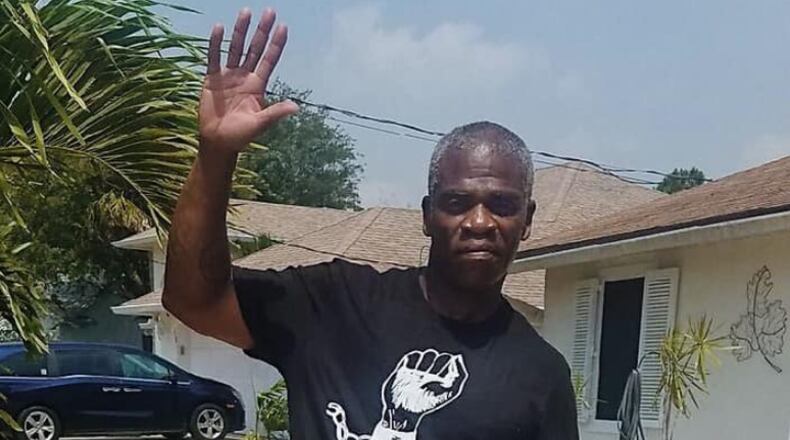Leonard Cure found a fresh start in metro Atlanta and was making up for precious time lost.
After 16 years locked away in a Florida prison for a crime he didn’t commit, Cure was a free man. The 53-year-old had recently purchased a home in Palmetto and was finally reconnecting with his family. Just three weeks ago, Cure was educating high school students in Clayton County about his wrongful conviction and looking ahead to future pursuits — a college degree and a career in the music business.
“His life was tragically cut short,” said Innocence Project of Florida Executive Director Seth Miller, who worked with Cure to exonerate him.
On Monday morning, Cure was shot and killed by a Camden County deputy after he was pulled over on I-95 in a rural area north of Kingsland, about nine miles from the Florida border, according to the GBI. Special Agent Stacy Carson confirmed Tuesday that he was stopped on suspicion of reckless driving and speeding.
The state agency said Cure got out of his car at the request of the deputy and cooperated throughout the stop until he learned he was going to be arrested on the traffic charges. Once he stopped complying, the deputy used his Taser, the GBI said.
Investigators said Cure then assaulted the deputy, who used his Taser again and hit Cure with his baton. Still Cure did not comply, and the deputy shot him, the GBI said following an initial investigation. He was treated by paramedics and later died.
Cure was on his way back home after visiting his mother in South Florida, according to Miller, the nonprofit director. Carson said his traffic charges were among many elements of Monday’s shooting that remain under investigation.
“Lenny was a great person who had already lost 16 years of his life to wrongful incarceration. And now this,” the Innocence Project of Florida posted on Facebook announcing his death. “He and his family deserved better. Lenny’s life mattered.”
In 2004, Cure was sentenced as a recidivist to life in prison after he was convicted of armed robbery at a Walgreens in Broward County the previous year. The robber left the store with $1,700.
He was exonerated in 2020 based on a finding of “actual innocence” following a new investigation initiated by the Innocence Project of Florida and the Broward County State Attorney’s Office’s Conviction Review Unit. His case was the first success for the unit led by Assistant State Attorney Arielle Demby Berger.
Cure had petitioned in 2019 to Berger, who immediately began examining the case. The review found that an ATM receipt proved Cure was miles away from the crime scene at the time of the robbery. Investigators also determined that a photo array showed to a victim had multiple photos of Cure and “was therefore an unreliable, suggestive identification procedure,” prosecutors said at the time.
“The Leonard we knew was a smart, funny and kind person,” Broward State Attorney Harold F. Pryor said Monday in a statement. “After he was freed and exonerated by our office, he visited prosecutors at our office and participated in training to help our staff do their jobs in the fairest and most thorough way possible. He would frequently call to check in on ... Berger and offer our team encouragement to continue to do the important work of justice.”
In June, Florida Gov. Ron DeSantis approved a claims bill that awarded Cure $817,000 in compensation from the state for his wrongful conviction and imprisonment. Cure, who had a security job, was ecstatic to hear the bill also offered him 120 hours worth of college tuition and fees. He received his check in August, Miller said.
Rep. Michael Gottlieb sponsored the claims bill and vividly remembers the day it passed. He said there were at least 50 bills on the House floor and his was the second or third to last. All day, Cure sat patiently waiting at the top of the gallery.
“He just threw his fist into the air when the bill was passed,” Gottlieb told the Atlanta Journal-Constitution on Tuesday. “He had lived without money, but it was a right being wronged. I just remember with a powerful image of him, celebrating that win.”
After being separated from his family for nearly two decades, Cure was just starting to reconnect and set down roots on Atlanta’s Southside. He was very close to his brother and mother, Miller said.
“We will do all we can to support Lenny’s family and all who knew him and loved him,” he said.
It was just last month that Cure spoke to students at Jonesboro High School in honor of Wrongful Conviction Day, according to the Georgia chapter of the Innocence Project, which said it was grateful to get to know Cure. He deserved to live his life in freedom, the organization said in a statement.
“Words cannot express our devastation at the loss of a member of the Georgia Freed and Exonerated Community,” the statement read. “Leonard was a wonderful friend and an active participant in educating Georgians about wrongful conviction.”
About the Author
Keep Reading
The Latest
Featured



